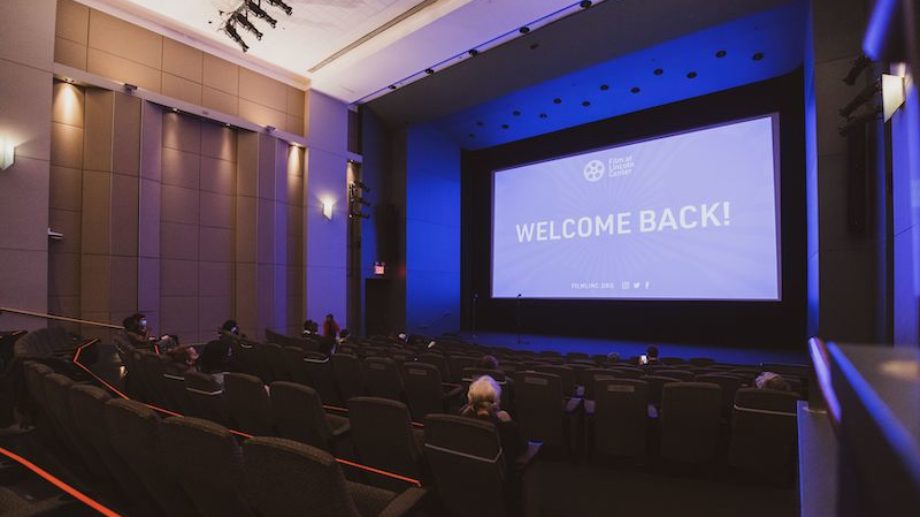The 50th-anniversary edition of New Directors/New Films concluded late last week, marking the Museum of Modern Art and Film at Lincoln Center’s first-ever in-theater and online hybrid format. Available to more audiences than ever before, the 2021 slate boasted 27 features, 11 shorts (over two programs), three free virtual alumni talks, dozens of filmmaker Q&As, a free virtual retrospective that spanned 30 years, and special FLC member events such as the programmer preview panel and ND/NF virtual Film Club.
In the years he has covered New Directors/New Films, Filmmaker Magazine‘s Nelson Kim writes, “one thing I’m always hoping for from new directors and new films — which ND/NF has reliably supplied in the years I’ve attended — is experimentation with form…You want to see younger directors come up with their own approach to film language, rather than mimic the forms of the past. ND/NF films like Aleph, Rock Bottom Riser, and All the Light We Can See satisfied that hunger.”
If you didn’t get to attend this year’s festival in some form, below are just a few of the many highlights from this year’s event (and check out our festival midpoint check-in post) as well as news on where the films’ journeys continue from here. To learn more about each film, visit newdirectors.org and follow ND/NF on Twitter and Facebook for further announcements about next year’s slate.
To watch all of this year’s ND/NF talks and Q&As, click here.
ND/NF 50th Anniversary Talk: Wendy Keys with Sara Driver
Founding ND/NF programmer and current FLC board member Wendy Keys moderated an extended conversation with Sara Driver about her acclaimed first feature, Sleepwalk (ND/NF 1987), and its place in Driver’s distinctive, idiosyncratic oeuvre.
Want to learn more about past ND/NF alumni? Click the image below to explore the #NDNF50 hashtag that incorporates filmmakers from the festival’s past and present!
The 1989 Closing Night selection of the 18th edition of #NDNF, Trinh T. Minh-ha's SURNAME VIET, GIVEN NAME NAM presented a formally complex collage of the experiences of multiple generations of Vietnamese and Vietnamese-American women. #NDNF50 pic.twitter.com/kIwmIMIv3Z
— New Directors/New Films (@NDNF) May 8, 2021
Thanks for this great talk- rich, detailed, cinephile – @FilmLinc with Kleber Mendonça Filho @kmendoncafilho on Brazilian cinema/production, about his own films (including Neighbouring Sounds, Aquarius and Bacurau), and concluding on 'tensions narrative' #NDNF50 https://t.co/8RzvpKuj70
— Marie-Pierre Richard (@mpr_mapie) May 2, 2021
"PARIAH really feels like something rare," @Wesley_Morris reflected in @BostonGlobe about Dee Rees' debut feature, a selection of the 40th #NDNF and an addition to the @Criterion collection this June. #NDNF50 pic.twitter.com/HcVC9s3GUu
— New Directors/New Films (@NDNF) April 27, 2021
The first entry in the director's "coming-of-age" trilogy, Hou Hsiao-hsien's A SUMMER AT GRANDPA'S screened as a selection of the 15th edition of #NDNF in 1986. #NDNF50 pic.twitter.com/YIcz5l3mXb
— New Directors/New Films (@NDNF) May 7, 2021
"Sally Potter's ironies, veering between the blunt and the exquisite, the oblique and the confrontational, expose the cruel hazards of nature and the perversities of culture." – @tnyfrontrow (@NewYorker) on Sally Potter's ORLANDO, a selection of the 22nd #NDNF in 1993. #NDNF50 pic.twitter.com/IwIDTkOc8u
— New Directors/New Films (@NDNF) May 6, 2021
A selection of the 20th #NDNF in 1991, Wong Kar Wai's second feature, DAYS OF BEING WILD, marked the first of seven collaborations between the director and cinematographer, Christopher Doyle. #NDNF50 pic.twitter.com/eJ5c03YnAr
— New Directors/New Films (@NDNF) May 4, 2021
"One of the most phenomenal debut films in the history of movies," @NewYorker critic Pauline Kael raved in 1974 on the subject of 26-year-old Steven Spielberg's THE SUGARLAND EXPRESS, the opening night film of the 3rd edition of #NDNF. #NDNF50 pic.twitter.com/POnIVakrOH
— New Directors/New Films (@NDNF) May 1, 2021
While still a Graduate student at NYU, Spike Lee's one-hour master thesis, JOE'S BED-STUY BARBERSHOP: WE CUT HEADS, screened at the 12th edition of #NDNF and won a Student Academy Award in 1983. #NDNF50 pic.twitter.com/wrJPOCIgkO
— New Directors/New Films (@NDNF) April 29, 2021
After film school, a job as a video store clerk, and two short films, Nicole Holofcener made her feature debut film, WALKING AND TALKING, a selection of the 25th #NDNF and an inclusion in @EW's Top 50 Cult Films of All-Time. #NDNF50 pic.twitter.com/aCTigca0WQ
— New Directors/New Films (@NDNF) April 26, 2021
All Light, Everywhere (Closing Night film)
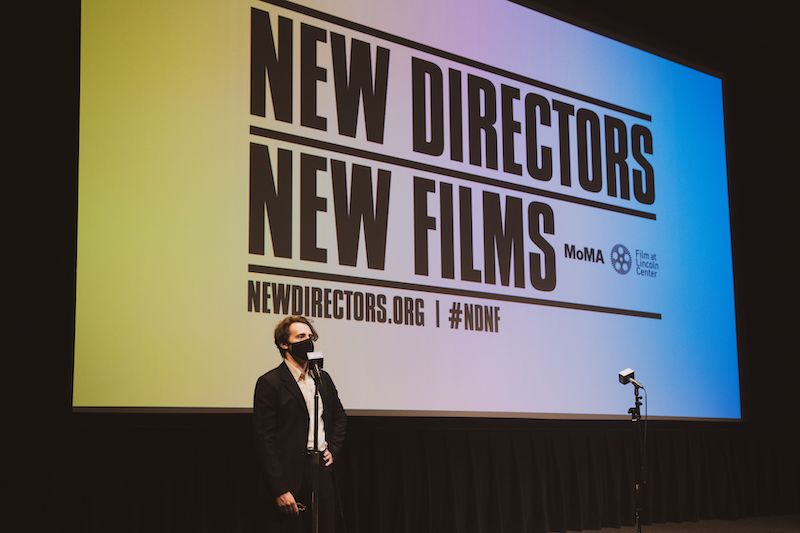
Assistant Programmer Tyler Wilson introduces Theo Anthony’s “All Light, Everywhere.” Photo by Arin Sang-urai
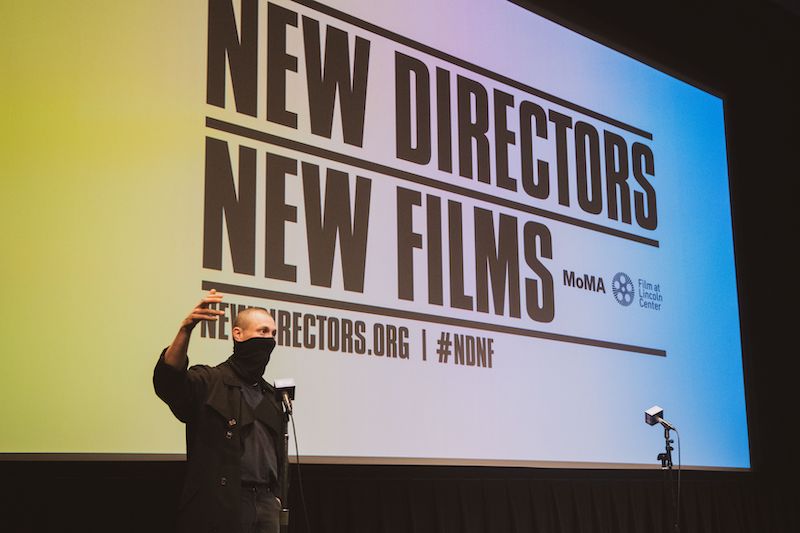
Director Theo Anthony introduces “All Light, Everywhere.” Photo by Arin Sang-urai
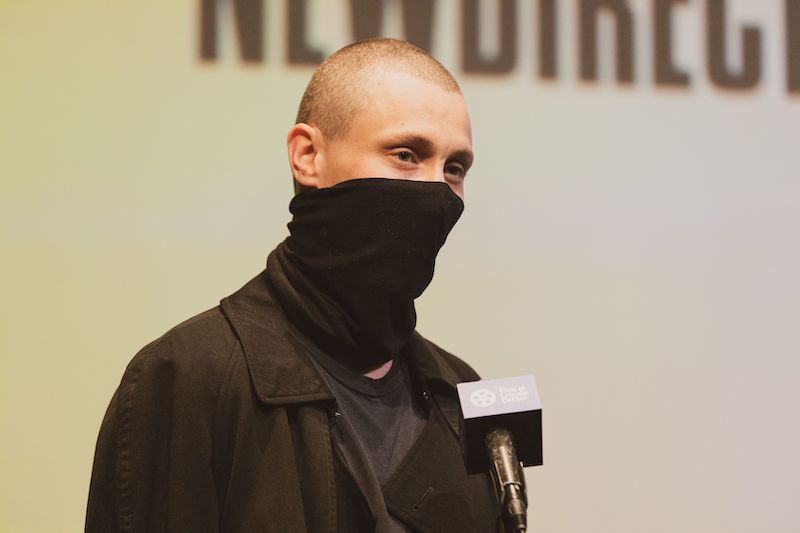
Director Theo Anthony introduces “All Light, Everywhere.” Photo by Arin Sang-urai
As evidenced by his provocative 2016 feature debut Rat Film, Theo Anthony sees the nonfiction cinematic form as an opportunity for forensic exploration and an essayistic zeroing in on the entrenched biases that lie beneath our contemporary social and technological realities. His new film is a breakthrough, using the increased regularity of body cams in U.S. law enforcement as the anchor point for an ever-expanding treatise on perception, power, and policing, and how these ideologies stem from legacies of racial profiling that in part define the makeup of the Western world.
Aleph
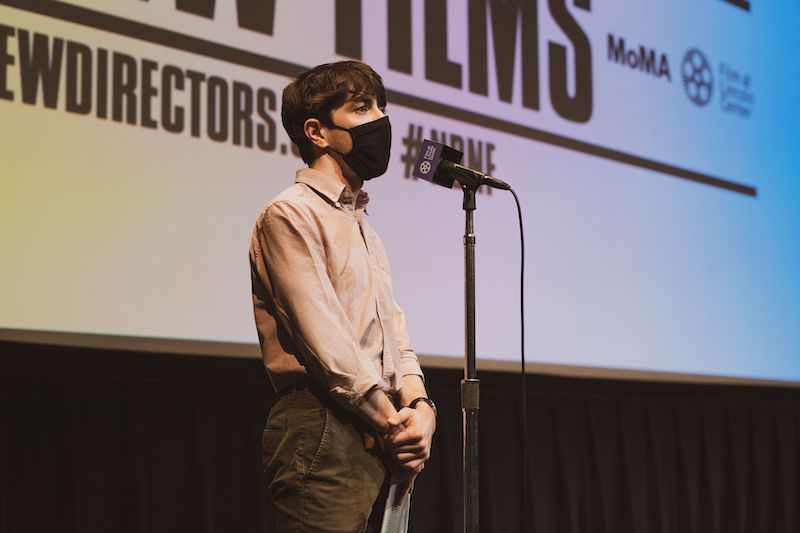
Assistant Programmer Tyler Wilson introduces Iva Radivojević’s “Aleph.” Photo by Arin Sang-urai
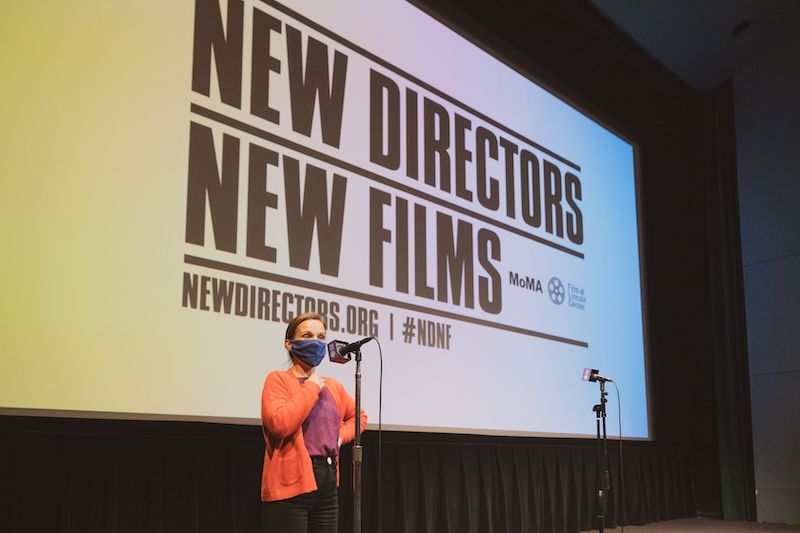
Director Iva Radivojević introduces “Aleph.” Photo by Arin Sang-urai
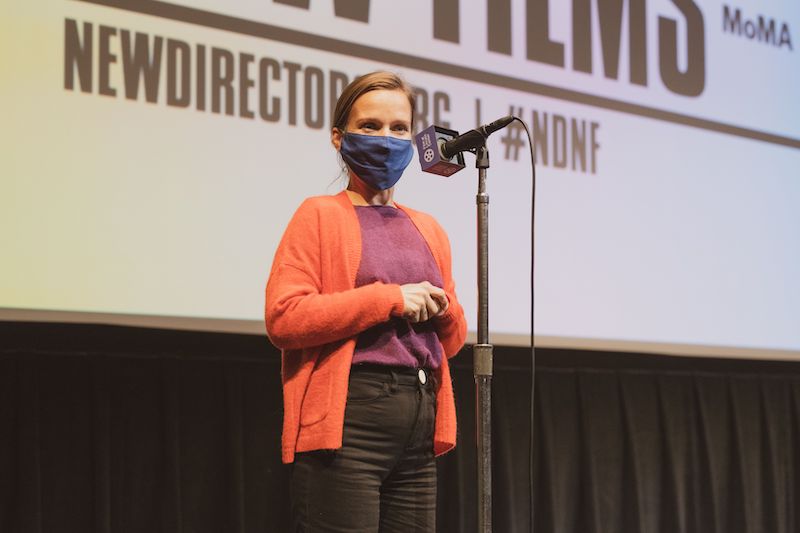
Director Iva Radivojević introduces “Aleph.” Photo by Arin Sang-urai
In her magical, unpredictable second feature, Belgrade-born, globe-hopping artist Iva Radivojević has created a labyrinthine vision inspired by the writings of Jorge Luis Borges. Using a variety of visual styles that miraculously cohere into one unified and unique aesthetic, the multihyphenate filmmaker and her collaborators offer an episodic structure bending time and space, in which one character seems to unwittingly pass the narrative baton to the next, fashioning a film whose scope extends from Argentina to Greenland to South Africa, with plenty of pit stops along the way.
Dark Red Forest
A work of visual awe and matter-of-fact spiritual inquiry, Dark Red Forest is a majestic documentary portrait that details the annual retreat of thousands of Tibetan nuns to small wooden houses on the vast Tibetan Plateau. With extraordinary intimacy, the camera nestles in with the women of the Yarchen Monastery, who, during the 100 coldest days of the year, learn about—and in some cases experience—profound matters of life and death, suffering and healing, karma and consequence.
Destello Bravío
A small town in southwestern Spain provides the setting for Ainhoa Rodríguez’s singular vision, a prismatic, alternately realist and uncanny rendering of lives in the rural Extremadura region. Adding surreal touches to a nonfiction framework, Rodriguez casts nonprofessional actors who add an oddball authenticity to this portrait of a community, especially focused on the secret desires and mysterious energies of its women as well as its religious ceremonial pageantry.
Eyimofe (This Is My Desire)
With fluid storytelling and precise, detailed attention to quotidian life, Nigerian filmmaking duo Chuko and Arie Esiri have created a tale consisting of two parallel narratives, following a pair of characters trying to transcend their daily struggles in teeming Lagos.
Opens at Film Forum on July 23rd. For more information, click here.
Faya Dayi
In her hypnotic documentary feature, Ethiopian-Mexican filmmaker Jessica Beshir explores the coexistence of everyday life and its mythical undercurrents. Though a deeply personal project—Beshir was forced to leave her hometown of Harar with her family as a teenager due to growing political strife—the film she returned to make about the city, its rural Oromo community of farmers, and the harvesting of the country’s most sought-after export (the euphoria-inducing khat plant) is neither a straightforward work of nostalgia nor an issue-oriented doc about a particular drug culture.
Faya Dayi will be released in theaters later this year courtesy of Janus Films.
Gull
O-bok, a woman in her early 60s, spends her days working at an outdoor fish market in Seoul and preparing for her daughter’s wedding. One night, her life is upended when she becomes the victim of a sexual assault by a coworker. As she comes to terms with what happened, she discovers that other colleagues have been all too eager to cover up the event, and that her family is incapable of handling her trauma.
Radiograph of a Family
Firouzeh Khosrovani has created an experience of profound immersion, using archival photographs, video footage, letters read aloud, and other fragments and mementos to tell the story of her family. The narrative of her parents—Hossein, a progressive-minded radiologist studying in Switzerland, and Tayi, the more devout Muslim woman he brings there from Tehran to marry—is also a valuable document of the history of contemporary Iran, deftly and movingly exploring assimilation versus tradition, and depicting her mother’s own awakening in the lead-up to the country’s cultural revolution that took shape in the late 1970s.
Short Vacation
A delightful meditation on young people’s discovery of the world around them, Short Vacation follows four middle school girls (members of their school’s photography club) who decide to spend a bit of their summer holiday seeking out the very ends of the earth. Armed with little more than disposable cameras, the girls take a line on the Seoul Metropolitan Subway as far as it goes before setting out on foot, continuing their journey while stopping frequently to admire the new-to-them scenery, to muse on the everyday events unfolding around them, and above all else, to strengthen their bonds through conversation and their shared experience of this eye-opening dérive.
What did you see at this year’s New Directors/New Films? What films do you recommend? Share with us on Twitter, Instagram, and Facebook, and stay tuned for more conversations on cinema.


